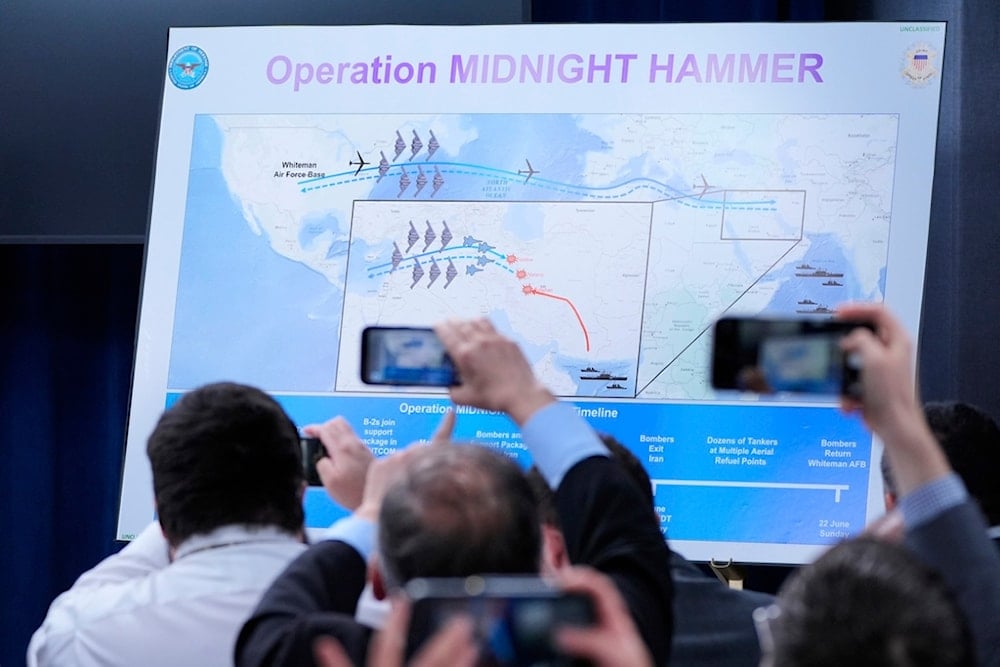CENTCOM voices uncertainty despite US claims of total success
US President Donald Trump quickly framed the attack as a total strategic victory, proclaiming that Iran's nuclear sites had been "completely and totally obliterated."
-

Reporters take photos of a displayed graphic as Defense Secretary Pete Hegseth and Joint Chiefs Chairman Gen. Dan Caine speak during a news conference at the Pentagon in Washington, Sunday, June 22, 2025, after the US military struck three sites in Iran, directly joining Israel's effort to destroy the country's nuclear program (AP Photo/Alex Brandon)
Following a high-profile US attack on Iran's nuclear infrastructure, contradictory statements from American officials have raised questions about the true outcome of the operation.
While the political leadership in Washington has declared the strikes a sweeping success, the military's more cautious tone suggests otherwise.
President Donald Trump quickly framed the attack as a total strategic victory, proclaiming that Iran's nuclear sites had been "completely and totally obliterated."
Defense Secretary Pete Hegseth reinforced that message in a Pentagon briefing, stating that "Iran's nuclear facilities have been 'obliterated'" and later adding that the strikes had "devastated the Iranian nuclear program."
He noted that the operation had not targeted Iranian civilians or troops and claimed the mission was about "neutralizing threats" rather than regime change. "Trump seeks peace, and Iran should take that path," Hegseth insisted.
However, this confident political narrative was tempered by military restraint. General Dan Caine, Chairman of the Joint Chiefs of Staff, offered a more measured assessment.
He confirmed that the three sites, Fordow, Natanz, and Isfahan, sustained "severe damage and massive destruction," but carefully noted it was "too soon to say whether Iran still retains some nuclear capability."
Vice President JD Vance has likewise refused to confirm with certainty that the nuclear sites were completely destroyed.
Speaking on NBC's Meet the Press, Vance stated, "I feel very confident that we’ve substantially delayed their development of a nuclear weapon, and that was the goal of this attack."
However, he cautioned that he would not "get into sensitive intelligence,” and added, "We're not at war with Iran. We’re at war with Iran’s nuclear program."
Conflicted Victory
His refusal to echo Trump and Hegseth's use of the term "obliterated" highlights the uncertainty at the heart of the operation's aftermath.
Analysts have pointed out that the most sweeping claims "have not been independently confirmed," suggesting that the political leadership may be inflating the perception of success for strategic or domestic purposes.
The deployment of B-2 bombers and bunker-busting munitions was certainly designed to showcase overwhelming force, but military officials have stopped short of declaring total success.
Meanwhile, Iranian officials rejected the portrayal of decisive damage. They reported no radioactive leaks and reiterated that the country maintains the right to defend its sovereignty and technological advancement.
Earlier in the day, Iran's Foreign Minister Abbas Araghchi has accused the US and "Israel" of crossing a "very big red line" by launching coordinated attacks on Iranian nuclear sites, warning that Tehran will respond by “all means necessary.”
Read more: Iran: Minor damage to nuclear sites after US attack, no radiation

 3 Min Read
3 Min Read










